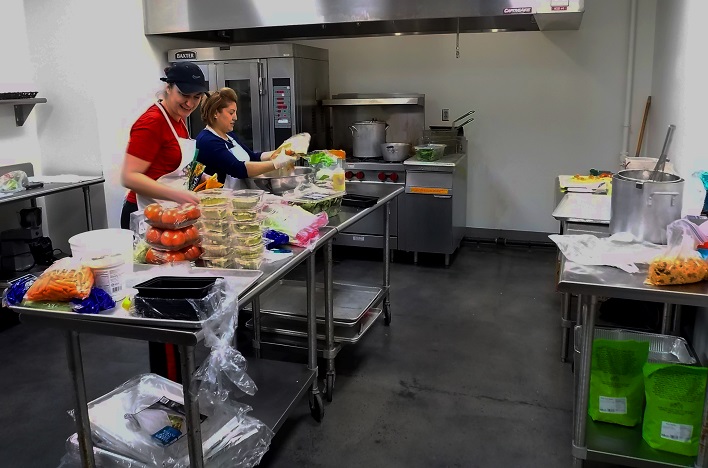Consumer food products are a huge business in Kansas City—and not just for big companies.
There’s no question: The consumer food business is one of the United States’ largest and most important industries, generating about $1.1 trillion in annual sales, the Grocery Manufacturers Association reports.
In Kansas and Missouri, consumer food production employs about 30,000 and 43,000 people, respectively. Nationally, food manufacturing accounts for 12 percent of all U.S. manufacturing jobs, more than any other sector.
Kansas City is home to production facilities for major brands like Sara Lee, General Mills, Kellogg’s and others. Large companies appreciate Kansas City for its location, both to the region’s agricultural producers and to local interstates and distribution networks.
But as big as consumer food products are as a business, there is still plenty of room for smaller companies to find their own niche in this sector. In fact, some of Kansas City’s most impressive small business successes are food companies.
» Boulevard Brewing Co. has announced a series of distribution agreements that have introduced its products to several new states. The company has expanded its production capacity and plans to open a new visitors center to accommodate the huge crowds that tour its West
Side facilities.
» Shatto Milk Co. has continued to roll out a series of products, including flavored butters and ice cream sandwiches. Its most recent innovation: Shatto’s home delivery, which not only brings the company’s dairy products to your door, but a range of other locally produced food brands.
» Whether you’re talking about its award-winning beans, its popular chain of local cafes or spinoff products like its teas, The Roasterie has continued to thrive as Kansas City’s best-known coffee brand.
» You can’t talk about Kansas City’s food entrepreneurs without noting the string of highly successful barbecue brands based here. Many of them are restaurateurs—Gates, Arthur Bryant’s, Fiorella’s Jack Stack—but we also have incubated an active community of sauce producers. (Heck, some even ship their meat across the country.)
“The reason why we are in Kansas City and why we feel we have a competitive edge is we are centrally located in the United States,” said Joe Polo, founder of Original Juan Specialty Foods.
The company, which is approaching the 20-year mark, produces several salsas of its own and offers co-packing for clients’ salsas, barbecue sauces and other products. Being in Kansas City gives Original Juan an edge on shipping rates, and the city offers both reasonable pay rates and an experienced workforce in food production, Polo said.
Room for the Little Guy
Kansas City’s growing reputation as a haven for foodies seems to be encouraging even more aspiring entrepreneurs to turn their favorite recipes into full-fledged businesses.
 “Today, there seems to be a buzz in KC with startups and opportunities for consumer food products, compared to five years ago, when I got started with my business,” said Jill McEnroe, the owner of Frannie Franks Coffee Cakes.
“Today, there seems to be a buzz in KC with startups and opportunities for consumer food products, compared to five years ago, when I got started with my business,” said Jill McEnroe, the owner of Frannie Franks Coffee Cakes.
It all began when, one day, McEnroe needed to bring a birthday treat to work for her boss, but didn’t have the extra cash to buy from the store. So she dug into her mother’s handwritten recipe book and found the directions for a killer coffee cake.
“I made two,” she said. “One for my boss, and one for my husband to take to work. The next day, my boss walked back to my desk and whispered in my ear, ‘You could sell those.’ Then, when I got home, I had a stack of orders to fill from my husband’s work.”
McEnroe got connected with the Independence Regional Ennovation Center, which rents out commercial kitchen space to several up-and-coming consumer food producers.
“There was no possible way that I would’ve been able to afford my own commercial kitchen space and everything I needed in it to produce my delectable cakes,” McEnroe said.
The Ennovation Center also provides a range of business consulting services to new food entrepreneurs, especially when it comes to regulatory compliance.
“It’s a very intimidating process, and we hear this from all our businesses as they come in,” said Xander Winkel, a program manager at the Ennovation Center.
Securing funding is a struggle for many small businesses, but it can be particularly tough for consumer food products, which tend to have a low margin and high capital expenses, Winkel said.
“Most people don’t realize how much it costs,” said Shannon Kimball, who with his wife, Lori, operates Flavor Trade, a Kansas City, Mo., company that offers co-packing, distribution and incubation services to gourmet food producers.
Shannon left construction and went into the food business on a full-time basis after his barbecue sauce, FireBug, won the Best Sauce of the Planet award at the 2013 American Royal Barbecue.
The great thing about launching in Kansas City is that customers here are loyal to local brands, Shannon Kimball said. And the established food entrepreneurs, more often than not, are willing to share advice with people who are just starting out.
‘A Very Special Place to Grow a Business’
Another powerful resource for local food producers is the Food Innovation Accelerator at Kansas State University’s Olathe campus.
K-State Olathe can assist with a range of technical problems, including product formulations and improvements to the production process, said Bryan Severns, manager of food programs and services. The Olathe accelerator is also backed up by the resources of the Kansas Value Added Food Lab at K-State’s main campus in Manhattan.
Everyone from startups to larger companies consult with Severns and K-State Olathe on everything from candy to sauerkraut to pet treats. The accelerator has helped small businesses triple and quadruple their production capacity.
Kansas City can sometimes be a tough place to launch a new consumer food product, he said.
New condiments and salsas do well in Kansas City—just witness the huge assortment of barbecue sauces the next time you visit your grocery store. Historically, though, people here tend to have more conservative tastes in food products, Severns said.
That might be slowly changing. Kombucha and other fermented products are starting to attract an audience here, he said. And the city has some new, high-quality butcher shops and charcuteries.
“Kansas City is a great size and offers an interesting landscape for growing a business,” Severns added. “It’s big enough to support new food companies, but not so large that people get lost in the shuffle. And while the region might need more contract commercial kitchens, there is a strong web of resource groups serving new entrepreneurs.”
Janet Smith and her husband, Randy, own Borgman’s Dairy, an 80-year-old, Grade-A, farmstead goat dairy. Borgman’s produces cajeta, goat milk caramel sauce; goat cheese cheesecakes; and goat cheese truffles. Smith said she has received great advice and help from entrepreneurship organizations, like the Regnier Institute for Entrepreneurship and Innovation at UMKC, as well as groups devoted to local food, including the Kansas City Food Circle.
Smith is optimistic about the future of locally produced food. She is working to establish a new creamery in Kansas City, Mo. Once it’s complete, the creamery will create a range of artisanal cheeses and specialty dairy products.
“I think we have a very special place to grow a business.”

